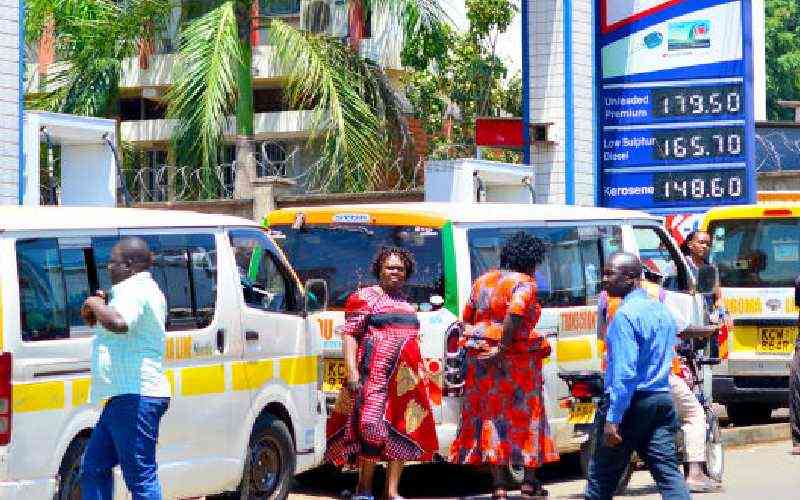
Kisumu petrol stations had effected the new prices of fuel. [Michael Mute, Standard]
The price of super petrol is higher than that of diesel and kerosene.
But this is not the true picture of the cost of diesel and kerosene, with the local retail prices being affected by higher taxes for super petrol and the subsidy for diesel and kerosene.
The landed cost, which is a reflection of global realities, shows an entirely different picture.
The landed cost is the cost of petroleum products on arrival in Mombasa before taxes, oil marketer margins and the fuel subsidy are applied.
The landed costs of diesel and kerosene are higher by as much as Sh20 compared with super petrol over the current October-November pricing cycle.
On arrival in Mombasa, the cost of diesel is Sh110.92 per litre, while that of kerosene is 109.71 per litre. This is in comparison to super petrol whose landed cost is Sh90.99.
The landed costs are also in comparison to retail costs, with super petrol retailing at Sh178.30, much higher than diesel at Sh163 and kerosene at Sh146.94 per litre.
Super petrol retails at higher prices on account of higher taxes - which are more than Sh10 per litre compared with what is levied on diesel and Sh17 more than the taxes on kerosene. Currently, super petrol is retailing at Sh178.3 per litre in Nairobi, diesel at Sh163 and kerosene at Sh146.94.
The landed costs of diesel and kerosene have been going up over the last year, an indication of higher costs in the global market. In January this year, for instance, the landed cost of the three products was almost at par.
The cost of super petrol on arrival in Mombasa was Sh68.83 per litre, slightly higher than that of diesel (Sh65.10) and kerosene (Sh65.75). How is it then that the latter two products have become more expensive than super petrol and by a big margin at that? Analysts at the Energy and Petroleum Regulatory Authority (Epra) explain that global factors such as increased demand globally for kerosene and diesel have resulted in the landed costs going up over the last year.
Demand for diesel, for instance, is growing as Europe gets into winter and requires more fuel for heating.
The demand in Europe is on the back of the region's spat with Russia over its invasion of Ukraine. "High landed cost of diesel is due to high global demand caused mainly by low stock, especially in Europe and key hubs in the US amid increasing demand as winter (which places higher demand of heating fuels such as diesel) and harvesting seasons in the Northern hemisphere approach," said Epra in an analysis. It added that other factors at play are "speculation of a tighter market, especially with uncertainty over Russian diesel supplies to Europe as planned sanctions take effect beginning February next year.
Russian oil exports to Europe account for about 30 per cent of Europe's oil imports.
The regulator added that the continued recovery of the travel industry has put pressure on jet fuel, which is more or less similar to the kerosene that households use for lighting and cooking. Kerosene is a key fuel for many poor households or those not connected to the national electricity grid. The difference is usually that jet fuel is more refined to ensure that it meets certain standards, including lower freezing points to withstand cold temperatures when an aircraft is flying.
In other words, many households using a koroboi (small lantern) or a hurricane lamp are competing with airlines in buying the fuel. "The main driver of the high kerosene prices is the surge in demand for Jet A1 in the post-Covid-19 recovery," noted Epra.
A senior official with a major oil marketing firm offered some insights into what informs prices of petroleum products, particularly the landed cost. He noted that while crude oil prices are an indicator of the direction that local pump prices should take, there other factors that contribute to computing retail prices that might see them differ from crude oil prices.
These include refining costs that go up and down depending on seasonal global demand for petroleum products and shipping charges that have gone up as markets reopened following the effects of the Covid-19 pandemic that had depressed demand.
"The price of refined petroleum does also not always follow that of crude. It will always be slightly different," said the official, who cannot be named as they are not authorised to speak to the media. "This is because there will be the cost of refining, which is also determined by such factors as the time of the year. In summer, for instance, there is a huge demand for fuel as people in Europe and North America travel more and with it a lot of consumption of petrol, diesel and jet fuel. During this time, the refineries operate at full capacity, and hence the refining margins are high."
"When these markets are going through winter, the opposite happens - there is less demand for fuel as people mostly stay indoors and instead use natural gas for heating. This year might, however, be different owing to the tussle between Russia and Europe and people might turn to fuel oil for heating."
The refinery, shipping and other costs incurred before petroleum products get to Mombasa have gone up, resulting in the landed cost more than doubling over the last year.
While local fuel prices posted a marginal drop in the current cycle, indications are that the worst might not be over, with key indicators showing that the cost of petroleum products is set to go up globally.
Opec Plus - which is a lobby for oil producers under Opec (Organisation of the Petroleum Exporting Countries) and their allies, including Russia - earlier this month agreed to cut oil production by some two million barrels of oil per day in November.
This, the oil producers said, was informed by a relatively weaker global economy that has resulted in lower demand and, in turn, lower crude oil prices.
Increased demand for petroleum products in Europe over winter might mean higher oil prices.
 The Standard Group Plc is a multi-media organization with investments in media platforms spanning newspaper print
operations, television, radio broadcasting, digital and online services. The Standard Group is recognized as a
leading multi-media house in Kenya with a key influence in matters of national and international interest.
The Standard Group Plc is a multi-media organization with investments in media platforms spanning newspaper print
operations, television, radio broadcasting, digital and online services. The Standard Group is recognized as a
leading multi-media house in Kenya with a key influence in matters of national and international interest.

